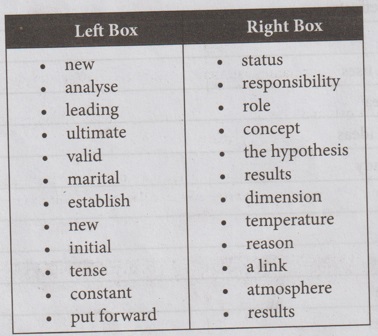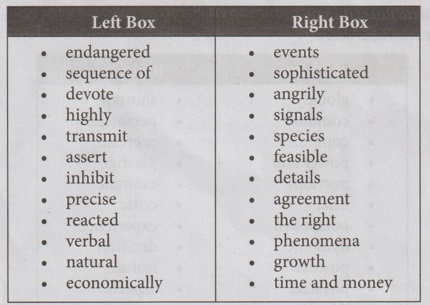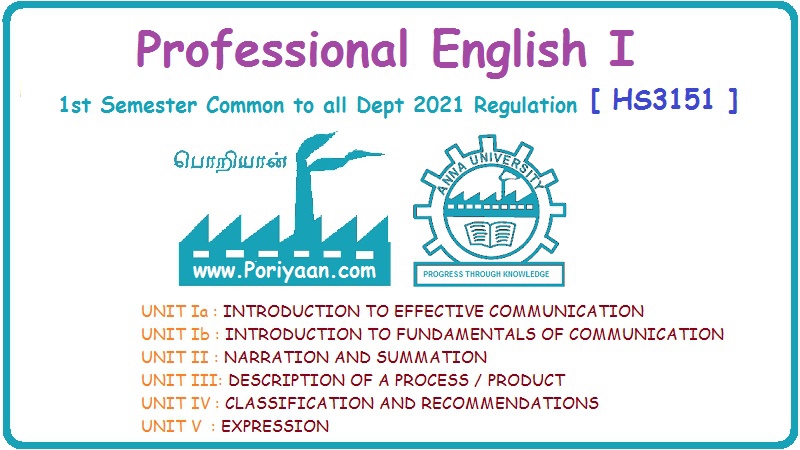Professional English I: Skill 2: Introduction to Effective Communication: Vocabulary
Collocations
Vocabulary | Professional English
A Collocation refers to two or more words that often go together and have a specific meaning.
Topic – 10 COLLOCATIONS A Collocation refers to two or more words that often go together and have a specific meaning. For example, in English, We often say heavy rain, or light rain, instead of strong rain or mild rain, heavy goes well with rain, whereas strong does not. This sort of language behaviour is called collocation. A native English speaker would never say 'strong rain' or 'mild rain'. If you use the normal collocation ('heavy rain' or 'light rain') your English will sound a lot better and more natural and it will be easier for native speakers to understand you. Here is a sample of collocate words I. Start by reading through the sentences below. Then take one word from the box on the left and combine this with one from the box on the right to make a collocation. For example, Valid can be joined with reason. (Note that more than one pairing may be possible and also that some words appear more than once.) Then try to match your combinations with the spaces in the sentences below: 1. If you submit work late, you will lose marks and may even be given a fail grade, unless you have a ______ such as illness. 2. One travel company is now advertising a completely ______ in tourism: flights into outer space by rocket. 3. At the bottom of the ocean, the water remains at ______ irrespective of changing weather conditions at the surface. 4. The growth of China will add a ______ to the economic and political situation in the Far East. 5. Students are expected not just to describe what they have done but also to ______ when they write a research report. 6. Investigators have been able to ______ between childhood illness and industrial pollution. 7. Following the demonstrations by thousands of students, there was a very ______in the capital, with many choosing to leave the city and head for the countryside. 8. Unfortunately, although the ______were very promising, the project failed in the long run because of lack of interest. 9. Engineers have played ______ in improving our health by giving us clean water supplies, perhaps more so than doctors. 10. The Managing Director may run the company, but ______ rests with the Board of Directors. 11. On the form, please give your name, nationality, address and indicate your _____ 12. When some scientists originally _____ known as global warming, the idea was not taken seriously, and yet today it is accepted by nearly everyone. II. Start by reading through the sentences below. Then take one word from the box on the left and combine this with one from the box on the right to make a collocation. (Note that more than one pairing may be possible and also that some words appear more than once.) Then try to match your combinations with the spaces in the sentences below: 1. In spite of advances in technology, we are still at risk from _________ such as earthquakes and floods. 2. One threat facing companies today is _________ computer 'hackers' who break into the most advanced computer systems. 3. The accident was the result of a tragic ______ which could have been prevented with better safety procedures. 4. The company ______ to the suggestion that its products were unsafe. 5. There is considerable doubt over whether the proposal by the American government for a manned trip to Mars is technically and _____. 6. Tigers (and other large cats) are now an _____ and may disappear altogether in the future. 7. After the Second World War, African nations started to _____ to become independent. 8. In law, a______ even though it is not written down like a formal contract, is still a contract. 9. While she refused to give any _____ the Minister admitted that several people had been arrested. 10. In order to produce new medicines, drug companies have to _____on huge scale to their research and development activities. 11. Most economists believe that high taxes _____ in the economy. 12. In spite of its age, the satellite is still continuing to _____ to Earth. III. Start by reading through the sentences below. Then take one word from the box on the left and combine this with one from the box on the right to make a collocation. (Note that more than one pairing may be possible and also that some words appear more than once.) Then try to match your combinations with the spaces in the sentences below: 1. After the Second World War, there was a _____ in Britain and so workers from other countries had to be recruited. 2. Some people found Mrs. Thatcher's style somewhat aggressive, while others preferred to regard her as having a forceful and _____. 3. His doctor advised him to give up fatty foods and to take some form of _____ such as golf. 4. In most countries, Mercedes-Benz cars are very famous because they are regarded as symbols of _____. 5. The university refused to make a _____on his application until he had taken a language test. 6. Without doubt, Coca-Cola is probably the _____ of a product that is known world-wide. 7. Employees are always keen to recruit staff with good qualifications and relevant _____. 8. Those language learners who focus on the _____ of living in a new culture rather than on the disadvantages tend to learn more quickly. 9. Because she was an _____ of the government, she was kept under house arrest for a number of years. 10. Unfortunately, rising crime rates seem to be an increasingly ____ of life in big cities today. 11. The Internet, as the name implies, is really a huge ____, linking computers all over the world. 12. Tourism is now a very significant part of the ____. earning millions of dollars. IV. Choose which one of the following verbs goes well with the expressions below: (Get, Do and Make) 1. _________ a goal 2. ________ peace 3. ________ lost 4. ________ a home 5. ________ an appointment 6. ________ a lesson 7. ________ homework 8. ________the cooking 9. ________ ready 10. ________ progress 11. ________ someone's help 12. ________ nothing 13. ________ an effort 14. ________ one's best 15. ________ furniture 16. ________ the shopping 17. ________trouble 18. ________someone a favour 19. ________the sack 20. ________a life 21. ________home 22. ________upset 23. ________wet 24. ________worried 25 ________startedINTRODUCTION

Practice Exercises



Professional English I: Skill 2: Introduction to Effective Communication: Vocabulary : Tag: : Vocabulary | Professional English - Collocations
Related Topics
Related Subjects
Professional English I
HS3151 1st semester | 2021 Regulation | 1st Semester Common to all Dept 2021 Regulation
